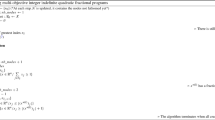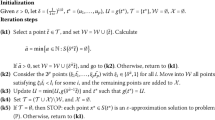Abstract
This paper develops an algorithm for solving quadratic fractional integer programming problems with bounded variables (QFIPBV). The method provides complete ranking and scanning of the integer feasible solutions of QFIPBV by establishing the existence of a linear or a linear fractional function, which acts as a lower bound on the values of the objective function of QFIPBV over the entire feasible set. The method involves ranking and scanning of the set of optimal integer feasible solutions of the linear or linear fractional program so constructed which requires introduction of various cuts at intermediate steps, for which, a new technique has been developed in the current paper. Numerical examples are included in support of the theory.
Similar content being viewed by others
References
Cambini, A., Martein, L., & Schaible, S. (1989). On maximizing a sum of ratios. Journal of Information and Optimization Sciences, 10, 65–79.
Chandra, S., & Chandramohan, M. (1980). A note on integer linear fractional programming. Naval Research Logistics Quarterly, 27, 171–174.
Charnes, A., & Cooper, W. W. (1962). Programming with linear fractional function. Naval Research Quarterly, 9(3–4), 181–186.
Chen, F., Huang, G. H., Fan, Y. R., & Liao, R. F. (2016). A non-linear fractional programming approach for environmental–economic power dispatch. International Journal of Electrical Power & Energy Systems, 78, 463–469.
Dahiya, K., & Verma, V. (2005). Ranking in integer programming with bounded variables. Opsearch, 24(3), 272–279.
Dinkelbach, W. (1967). On non-linear fractional programming. Management Science, 13, 492–498.
Freund, R. W., & Jarre, F. (2001). Solving the sum-of-ratios problem by an interior-point method. Journal of Global Optimization, 19, 83–102.
Ibaraki, T., Ishii, H., Iwase, J., Hasegawa, T., & Mine, H. (1976). Algorithms for quadratic fractional programming problems. Journal of Operation Research, Society of Japan, 19(2), 174–191.
Khurana, A., & Arora, S. R. (2011). A quadratic fractional programming with linear homogeneous constraints. African Journal of Mathematics and Computer Science Research, 4(2), 84–92.
Konno, H., & Abe, N. (1999). Minimization of the sum of three linear fractional functions. Journal of Global Optimization, 15, 419–432.
Konno, H., & Yamashita, H. (1999). Minimizing sums and products of linear fractional functions over a polytope. Naval Research Logistics, 46, 583–596.
Schaible, S. (1994). Fractional programming with sums of ratios. Working Paper 83, University of Pisa.
Schaible, S. (1977). A note on the sum of a linear and linear fractional function. Naval Research Logistics Quarterly, 24, 691–693.
Suleimann, N. A., & Nawkhass, M. A. (2013). Solving quadratic fractional programming problem. International Journal of Applied Mathematical Research, 2(2), 303–309.
Swarup, K. (1965). Some aspects of linear fractional programming. Australian Journal of Statistics, 7, 90–104.
Tantawy, S. F. (2007). Using feasible direction linear programming problems. Australian Journal of Basic and Applied Science, 1(2), 109–114. ISSN 1991-8178.
Acknowledgements
The first author is thankful to Council of Scientific and Industrial Research, India (Sanction No. 09/135/(0724)/2015-EMR-I) for providing financial support for carrying out this research.
Author information
Authors and Affiliations
Corresponding author
Rights and permissions
About this article
Cite this article
Jain, E., Dahiya, K. & Verma, V. Integer quadratic fractional programming problems with bounded variables. Ann Oper Res 269, 269–295 (2018). https://doi.org/10.1007/s10479-017-2484-5
Published:
Issue Date:
DOI: https://doi.org/10.1007/s10479-017-2484-5




